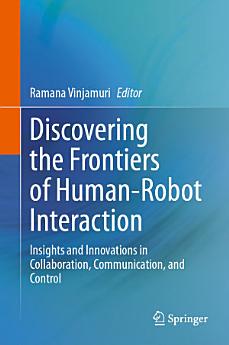Discovering the Frontiers of Human-Robot Interaction: Insights and Innovations in Collaboration, Communication, and Control
About this ebook
About the author
Ramana Vinjamuri received his undergraduate degree in Electrical Engineering from Kakatiya University (India) in 2002. He received his MS in Electrical Engineering from Villanova University in 2004 specialized in Bioinstrumentation. He received his Ph.D. in Electrical Engineering in 2008 specializing in Dimensionality Reduction in Control and Coordination of Human Hand from the University of Pittsburgh. He worked as a postdoctoral fellow (2008-2012) in the field of Brain-Machine Interfaces (BMI) to control prosthesis in the School of Medicine, University of Pittsburgh. He worked as a Research Assistant Professor in the Department of Biomedical Engineering at the Johns Hopkins University (2012-2013). He worked as an Assistant Professor in the Department of Biomedical Engineering at Stevens Institute of Technology (2013-2020). He is the recipient of the Harvey N Davis Distinguished Teaching Award in 2018 at Stevens. His research at Stevens was supported by Research and Innovation grants from the New Jersey Health Foundation. He received the NSF CAREER Award in 2019. He received an NSF IUCRC Planning grant in 2020, culminating in a successful planning meeting for the BRAIN center at UMBC in 2022, officially launching the center in 2024. His collaboration with Delsys, Inc., through an SBIR award from NIDILRR in 2022, evolved from his lab's research on virtual reality and hand synergies. With his role as a visiting scientist at NIDA and with the support of an NSF I-Corps grant in 2024 he is starting to commercialize neurotechnologies for mental health developed in his lab. His other notable research awards are from NSF I-Corps, NIDILRR, USISTEF and New Jersey Health Foundation. He is currently a tenured Associate Professor in the Department of Computer Science and Electrical Engineering at the University of Maryland Baltimore County. He holds a secondary appointment as an Adjunct Professor at Indian Institute of Technology, Hyderabad, India. His research interests are in the areas of – brain-computer interfaces, neuroprosthetics and exoskeletons, neurotechnologies for mental health, machine learning, and signal processing.




